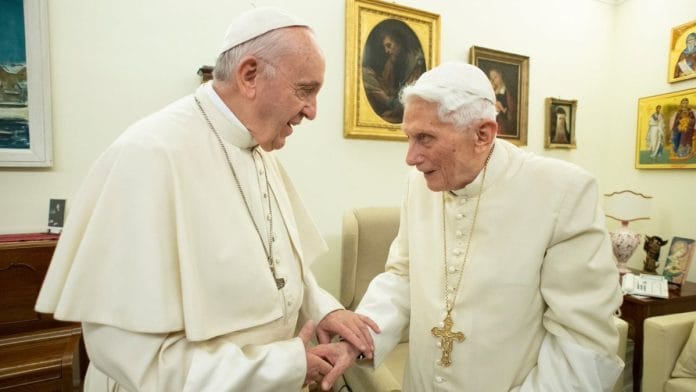The journey was long and tiring, but I was met by friendly faces in the baggage claim area at Fiumicino airport: Cardinal Odilo Pedro Scherer, archbishop of São Paulo, considered by the press to be a candidate for the papacy, or papabile, was there; also Cardinal Luis Antonio Tagle, archbishop of Manila at the time, likewise included among the papabili, who had traveled with a compatriot of his, Cardinal Ricardo Vidal.
They were all in clerical garb, except for Tagle, who was traveling in a polo shirt and jeans. I saw him again the next day and said, “There was a young man who looked just like you in the airport yesterday,” and we laughed long and hard. On the morning of February 28, I went to the Sala Clementina in the Apostolic Palace to pay my respects to Pope Benedict.
Great theologian that he was, he made a very profound speech that impressed me partly because on two occasions he quoted Romano Guardini, whom I had studied at length for my doctoral dissertation. He said, quoting that theologian: “The Church is not an institution devised and built at a desk . . . but a living reality. It lives along the course of time by transforming itself, like any living being, yet its nature remains the same. At its heart is Christ.” Our applause lasted a long time.
Also read: Francis: Outsider pope who humanised papacy, de-stigmatised homosexuality
Pope Benedict took the opportunity to affirm his promise of unconditional reverence for and obedience to the new pope, who would be elected in conclave from among us. It has caused me pain over the years, however, to see how his position as pope emeritus has been exploited for ideological and political ends by unscrupulous people who have not accepted his resignation, people who may have prioritized their own interests and guarded their turf while underestimating the risk of a dramatic split within the Church.
In order to avoid damaging distractions of this kind, Benedict and I jointly decided, when I visited him at Castel Gandolfo in 2013, immediately after my election, that it would be better if he did not live out of view, as he had originally planned, but saw people and participated in the life of the Church. This decision didn’t achieve much, unfortunately, because there was no shortage of disputes over the next ten years, and they harmed both sides.
During his handover to me, he gave me a white box containing the dossier, compiled by three cardinals, each over eighty years of age—Julián Herranz Casado, Jozef Tomko, and Salvatore De Giorgi— concerning the leaks of confidential documents that had shaken the Vatican in 2012.
Also read: Kama Sutra author wanted women to study 64 arts—gambling, sorcery, disguise
Benedict showed me the steps he had taken, removing people who were involved with lobbying groups and intervening in cases of corruption, and warned me about other situations in which it would be necessary to take action, telling me clearly that the baton was now being passed to me and it was for me to deal with it. And this I did and continue to do, following his advice.
 This excerpt from Pope Francis’ ‘Life: My Story Through History’, translated from the Italian by Aubrey Botsford, has been published with permission from HarperOne, an imprint of HarperCollins Publishers.
This excerpt from Pope Francis’ ‘Life: My Story Through History’, translated from the Italian by Aubrey Botsford, has been published with permission from HarperOne, an imprint of HarperCollins Publishers.






